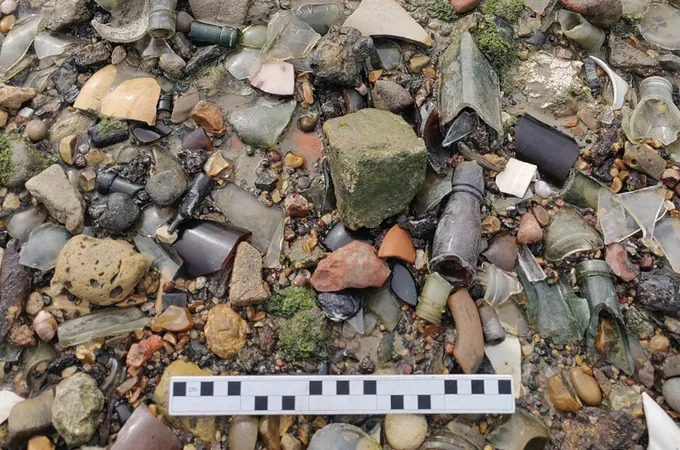
Unlocking the Ages: Are We in the Anthropocene?
2025-05-22
Author: Ming
A Journey Through Time: Understanding Our Place in Earth's History
The evolution of humanity has led us to a profound understanding of time—specifically, a concept known as 'deep time thinking.' This framework is exemplified by the Geologic Time Scale (GTS), which chronicles Earth’s 4.6 billion-year history—from its formation to the climatic events that shaped it.
The Chronicles of Earth's Ages
Scientists have meticulously pieced together areas of stability defined by geological and fossil evidence, constructing a timeline that reveals the emergence of life under various conditions. The International Union of Geological Sciences (IUGS) oversees this effort, especially through the International Commission on Stratigraphy (ICS), which classifies geological epochs based on notable changes captured in Earth's formations.
Within the GTS, time is depicted in a spiraling format, showcasing epochs with varying durations. Interestingly, as we move toward the outer spirals, time segments become progressively smaller, particularly following the Cambrian explosion around 500 million years ago—a period marked by a surge in complex life.
The Dawn of Humanity: A Recent Chapter
The first humanoids appeared just 7 million years ago, marking a blink in geological terms. Our evolutionary journey unfolded during the Quaternary Period, which kicked off approximately 2.58 million years ago, coinciding with early stone technology. As the Holocene Epoch commenced around 11,650 years ago with climate warming, early civilizations began to form.
Introducing the Anthropocene: A Controversial Epoch?
Proposals have emerged to define a new epoch—the Anthropocene—stating that this chapter would be characterized by the geological impact of human activities. A dedicated Anthropocene Working Group (AWG) seeks to determine if human-induced changes in the Earth’s layers justify this new classification. Despite widespread support, there’s still disagreement regarding the exact onset of the Anthropocene.
The Complexities of Human Impact
Archaeologists and geologists have joined forces to tackle the nuanced question of when human impact has become significant enough to warrant a new epoch. Some argue that traces of human behavior, such as alterations in ecosystems due to the overhunting of megafauna, date back tens of thousands of years.
A Rapid Evolution of Civilization
Fast forward to around 10,000 years ago when domestication of plants and animals led to burgeoning human populations. By 5,000 years ago, urban centers sprang up alongside remarkable technological advancements from metallurgy. This created a shift in land use and increased greenhouse gas emissions, leaving profound imprints in geological strata.
The Great Acceleration: A Defining Moment
The AWG has pinpointed the 1950s as a potential start for the Anthropocene, a period marked by the Great Acceleration—when human activity's geological signals became unmistakable. This era saw drastic changes, including climate deregulation, pollution, and biodiversity loss, all of which can be found documented in the Earth's geological record.
Ongoing Debates and Scientific Inquiry
In March 2024, the IUGS opted not to formally recognize the Anthropocene within the GTS, yet discussions continue. Unlike previous epochs lasting millions of years, the Anthropocene's timelines span a mere fraction of time—a reflection of today's rapid technological advancements.
The Technosphere: Humanity's New Layer
As we delve deeper into these discussions, the concept of the 'technosphere'—a physical manifestation of humanity's influence—has emerged. Defined as technological materials shaped by human interaction, this layer is growing rapidly and overtakes the natural biosphere in terms of mass.
Casting Future Shadows
As remnants of our modern life—plastic, polluted gases, and other anthropogenic residues—filter into sedimentary layers, they solidify our legacy. The technofossils we leave behind will become crucial markers for future archaeologists, painting a vivid picture of our time.
Ultimately, whether we formalize the Anthropocene or not, it’s clear that human activity has irrevocably shaped our planet—and we stand at a pivotal moment in Earth's evolutionary narrative.




 Brasil (PT)
Brasil (PT)
 Canada (EN)
Canada (EN)
 Chile (ES)
Chile (ES)
 Česko (CS)
Česko (CS)
 대한민국 (KO)
대한민국 (KO)
 España (ES)
España (ES)
 France (FR)
France (FR)
 Hong Kong (EN)
Hong Kong (EN)
 Italia (IT)
Italia (IT)
 日本 (JA)
日本 (JA)
 Magyarország (HU)
Magyarország (HU)
 Norge (NO)
Norge (NO)
 Polska (PL)
Polska (PL)
 Schweiz (DE)
Schweiz (DE)
 Singapore (EN)
Singapore (EN)
 Sverige (SV)
Sverige (SV)
 Suomi (FI)
Suomi (FI)
 Türkiye (TR)
Türkiye (TR)
 الإمارات العربية المتحدة (AR)
الإمارات العربية المتحدة (AR)